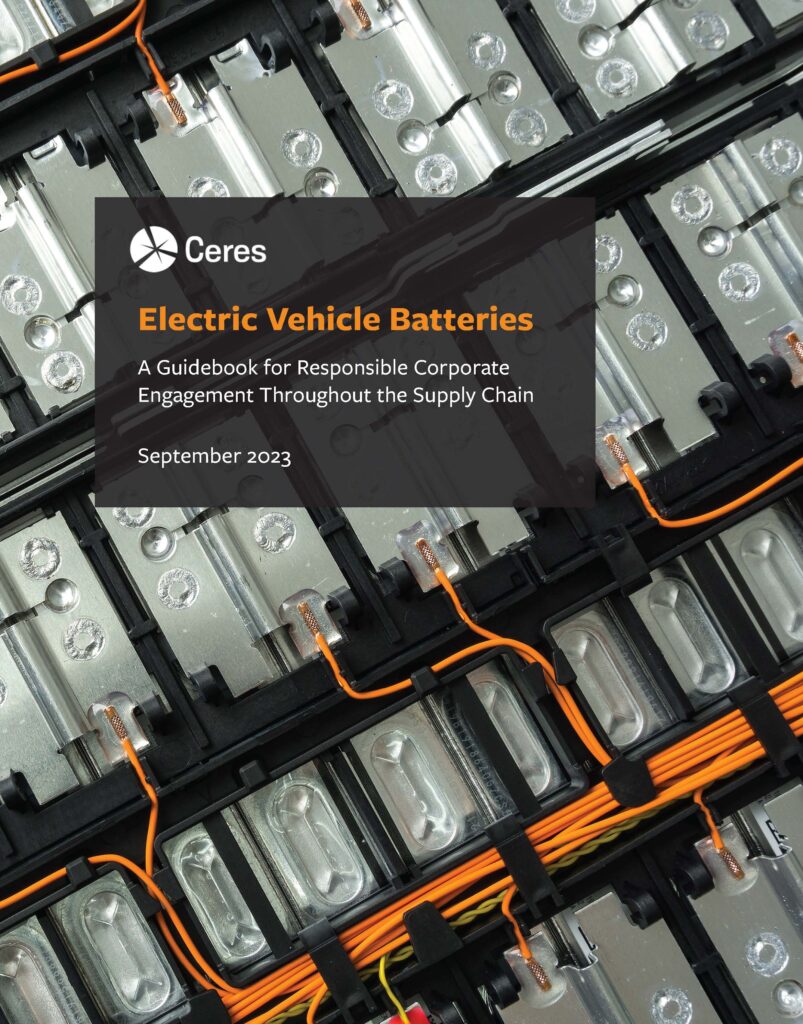How Major Corporate Fleets Can Drive Responsible and Sustainable EV Battery Supply Chains
New CLEE/Ceres report released today with recommendations for corporate EV fleet managers
The electric vehicle (EV) market is growing rapidly, but with this growth comes public pressure to ensure supply chains for EV batteries are sustainable. The soaring demand for batteries relies heavily on the extraction and refinement of critical minerals, processes that have far-reaching environmental and social impacts. Moreover, the global distribution of these operations leaves them susceptible to geopolitical instability, further complicating the supply chain.
At the same time, this growth in mining and manufacturing also presents an opportunity to avoid recreating the harms of past mining and industrial activities. While individual EV buyers have little leverage over the industry, fleet purchasers of EVs instead have an opportunity to use their combined market power to ensure upstream suppliers adhere to strong sustainability standards. Corporate fleets can wield their collective influence and purchasing power to drive change on a large scale. With that market power in mind, CLEE has partnered with the nonprofit Ceres and its Corporate Electric Vehicle Alliance (CEVA), a collaborative group of companies focused on accelerating the transition to EVs.
Today we release a new report with Ceres with recommendations for major corporate EV fleet purchasers for how they can help ensure supply chain sustainability. The report summarizes the market status of the batteries, U.S. policy context, and key initiatives for improvement in three categories where major fleets can help create positive outcomes: critical minerals mining; second life and recycling; and battery traceability.
Among other solutions, the report recommends that corporate actors looking to make EV fleet purchases:
- Join the Initiative for Responsible Mining Assurance (IRMA) in order to publicly demonstrate commitment to responsible sourcing; and add political momentum and end-user economic clout to IRMA’s efforts to engage and audit the mining industry
- Advocate for domestic mining reform that expands mining only as much as necessary while ensuring responsible environmental management and clean up as well as community and Tribal engagement
- Participate in extended producer responsibility schemes and build partnerships with second life and recycling entities.
- Advocate for federal policy to standardize EV battery labeling and traceability through an open-source, interoperable digital product passport with requirements designed to improve environmental and human impacts, carbon footprint, and end of life opportunities.
- Advocate for federal policy to standardize EV battery labeling and traceability through an open-source, interoperable digital product passport with requirements designed to improve environmental and human impacts, carbon footprint, and end of life opportunities.
While the report’s primary focus is on U.S. companies operating electric vehicle fleets, the information and recommendations can also benefit other companies involved in the EV supply chain. The goal is to highlight areas where corporate advocacy and procurement practices can have the most impact in promoting a sustainable EV industry.
Ensuring a sustainable EV battery supply chain—one that maximizes benefits for communities, industry, and the environment—will require long-term, coordinated action by stakeholders across the globe. Large fleets and major companies can leverage their purchasing power and engagement with industry to incentivize manufacturers and mining operators to prioritize sustainability and responsible practices. The recommendations in this guidebook offer a roadmap for corporate procurement practices, supplier engagement, and support for policies and initiatives that aim to make ethical sourcing and environmental stewardship the industry norm.
Access the full report here: Electric Vehicle Batteries: A Guidebook for Responsible Corporate Engagement Throughout the Supply Chain






Reader Comments